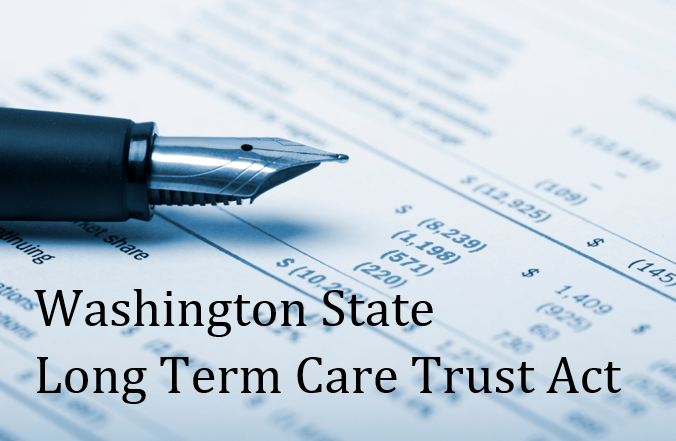Washington State Long-Term Care Program- Employers Take Notice & Act Quickly

Employees now have until November 1, 2021, to purchase long-term care insurance if they wish to opt out of the Washington State Long-Term Care Program. On April 14, 2021, the House passed an amendment to the original Bill (SHB 1323), extending the deadline from July 24, 2021, to November 1, 2021. (Reflected in original post, below.)
Although this is a welcome delay, employees must still act quickly to secure long-term insurance coverage as defined by RCW 48.83.020 to permanently opt out of the Program. The opt-out window is unchanged and runs from October 1, 2021, to December 31, 2022. Although employers are not obligated to notify their employees of these deadlines, many will choose to do so, particularly if offering group long-term care products that will qualify for the opt-out.
Further guidance for employers, including educational materials to ensure employees are aware of the Program and that premium assessments will begin January 1, 2022, will be provided by ESD and DSHS by October 1, 2021.
The Washington State Long-Term Care Program, long under the radar, should now be at the top of every Washington state employer’s mind—as well as their employees. The law mandates long-term care benefits for Washington residents, paid for by a tax on employees’ wages.
The tax/premium collections are on track to commence January 1, 2022. Employees who plan to retire in the next 10 years will be required to pay premiums—but may never qualify for the benefit. There is an extremely limited opt-out exemption window, which opens on October 1, 2021.
Employers must act now to be ready to comply with payroll tax deductions and to inform and answer questions from employees.
This advisory provides background on the Long-Term Care Program, a review of the proposed rules, and answers to the key questions employees may already be asking, including what they must do to opt out.
What Is the Washington Long-Term Care Program?
The Washington Long-Term Care Program is the nation’s first public state-operated long term care insurance program. The Program, which is codified at RCW chapter 50B.04, will be funded by a .0058 (0.58 percent) payroll tax on all employee wages, beginning January 1, 2022.
Employers will be required to collect this premium assessment via after-tax payroll contributions and will remit those premiums to the Washington State Employment Security Department (ESD) as part of their quarterly reporting. Employers are not required to contribute to the Program, just remit the employee-paid taxes.
Is There a Cap on the Amount of Wages That Are Taxed?
Of significance, and unlike other state insurance programs, there is no cap on wages. All wages and remuneration, including stock-based compensation, bonuses, paid time off, and severance pay, are subject to the tax. For example, an employee with wages of $65,000 will pay $377 toward the Program each year while an employee with wages of $250,000 will pay $1,450 toward the Program each year.
Which Employees Are Subject to Tax/Premium Collections?
All employees employed in Washington will be required to pay taxes into the Program. The exceptions are self-employed individuals, employees of a federally recognized tribe, certain collectively bargained employees, and employees who qualify for an exemption (discussed below).
For purposes of the Program, an employee is treated as employed in Washington if the employee’s service is localized in Washington or, if the service is not localized in any state, the employee performs some services in Washington and the services are directed or controlled from Washington (note that the Program defines “employment” in the same manner as used for the Washington Paid Family and Medical Leave Program).
Although we anticipate that ESD will provide clarifying guidance, this likely means out-of-state employers must collect and remit premiums for any employees who primarily work in Washington.
Who Is Eligible to Receive Benefits?
Benefits are limited to Washington residents who have paid premiums under the Program for either (1) a total of 10 years without interruption of five or more consecutive years; or (2) three years within the last six years from the date the application for benefits is made. In addition, to qualify, an employee must have worked at least 500 hours during each of the 10 years or each of three years, as applicable.
From a practical standpoint, this means that employees who plan to retire in the next 10 years will be required to pay premiums, but may never qualify for the benefits. In also means that retirees who move out of state will not qualify for the benefits.
What Are the Benefits Under the Program?
Benefits under the Program will first become available January 1, 2025. If eligible, and if the Department of Social and Health Services determines that an individual requires assistance with at least three activities of daily living, the Program provides benefits of up to $100 day, up to a maximum lifetime limit of $36,500.
Can Employees Opt Out of the Program?
Yes, as described in the proposed rules, an employee may opt out of the Program and all associated taxes and benefits if (1) the employee is 18 years old or older on the date he or she applies for the exemption, and (2) the employee attests that he or she has other long-term care insurance as defined in RCW 48.83.020.
To opt out, a qualifying employee must provide identification to verify his or her age and must apply for exemption with ESD (using a format that will be approved by ESD) between October 1, 2021, and December 31, 2022. If approved, an employee’s exemption will be effective for the quarter immediately following approval. Once an employee opts out, the employee cannot opt back into the Program, i.e., the opt-out is permanent.
There is nothing in the Program that prevents employees from dropping their other coverage following approval, but the employee will never become eligible for benefits under the Program.
When Must the Employee Have Long-Term Care Insurance in Place to Opt Out?
Employees must purchase long term care insurance before November 1, 2021 to be eligible to opt out of the Program.
How Will I Know If My Employees Have Opted Out of Washington State Long-Term Care Program?
After an employee’s application for exemption is processed and approved, he or she will receive an approval letter from ESD. The employee must provide this approval letter to his or her employer. Employers must maintain copies of any approval letters received.
If an exempt employee fails to provide the approval letter to his or her employer, the employer must collect and remit premiums beginning January 1, 2022. An employee will not be entitled to a refund of any premiums collected before the employee’s exemption took effect or before the employee provided the approval letter to his or her employer.
This could impact decisions regarding compensation timing—for example, if an employer knows that a large number of employees have filed for exemption, the employer may want to consider that those employees may appreciate delayed bonuses and stock awards so that such wages will not be subject to the payroll tax.
If an employer deducts premiums after an employee provides the employer with his or her approval notice, the employer must refund the deducted premiums and will be responsible for restoring the premiums to the employee. The employer is not eligible to receive a refund of the premiums from ESD.
What Happens If an Employee Moves Out of State?
Because benefits are limited to Washington residents, employees who move out of state will not be eligible to receive benefits under the Program. Employees who maintain a second home may, therefore, wish to consider which location will be their permanent residence.
Are Self-Employed Individuals Exempt?
Yes, self-employed individuals are exempt from the Program but may choose to opt in. Under the Program, self-employed individuals must elect coverage by January 1, 2025, or within three years of becoming self-employed for the first time.
Are Collectively Bargained Employees Exempt?
Parties to a collective bargaining agreement in existence on October 19, 2017, are not subject to the Program unless and until the existing agreement is reopened and renegotiated or the existing agreement expires. Parties must notify ESD when the collective bargaining agreement becomes open.
Is the Statute Preempted by ERISA?
Maybe. Because the Program mandates that employers maintain an ongoing administrative scheme that involves a program providing health, sickness and disability benefits, the Program may be preempted by ERISA.
See Washington State’s New Long-Term Care Statute Is a Mess – Can ERISA Preemption Provide the Cleanup? for additional information.
Reference: https://www.jdsupra.com/legalnews/update-not-aware-of-the-washington-7882872/




